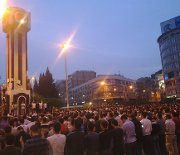By Dan Wooding
Founder of ASSIST Ministries
STOCKHOLM, SWEDEN (ANS) -- “While much of the rest of the world is waiting for the Assad regime in Syria to crumble, some Syrians, while not supporting the brutal dictatorship, still dread the prospect of a rapid disintegration of the Syrian state power. One such group is Assyrian Christians, who make up around 5 percent of the Syrian population. “There is great concern and fear among the Assyrians. Many think they will have to leave the country as soon as possible should the regime suddenly fall as a result of the uprising,” says Rima Haro, a political scientist and Middle East expert, herself of Assyrian origin, living in Sweden.”
So wrote By Aron Lamm in the Epoch Times (www.theepochtimes.com).
 |
File photo of Iraqi Assyrians in Damascus, Syria, wearing traditional dress to celebrate the New Year (Photo: Louai Beshara/AFP/Getty Images) |
As Christians in the Muslim-dominated Middle East, they have faced rounds of persecution throughout history, and just like the Kurds, they have not had a nation-state as a homeland.
One country, with a large Assyrian population is Sweden. Over 100,000 Assyrians live here, particularly in the city of Sodertalje, about 19 miles south of the capital Stockholm, he went on to say. Out of 80,000 inhabitants in Sodertalje, more than 20,000 Assyrians are a core part of the community.
“Haro, 36, has been an interpreter and journalist, and worked for the Swedish Ministry of Foreign Affairs, before becoming a local politician in Stockholm,” Lamb continued. “She is an example of why the Assyrians are considered one of Sweden’s most well-integrated immigrant groups.”
Born of an Assyrian mother and an Armenian father in the northeastern Syrian town of Qamishli, she moved with her family to Sadertalje when she was 10 years old. Like many other Assyrians in Sweden, she is very worried about the current situation in her homeland.
“To be perfectly honest, I dread the prospect of a regime collapse,” she said. “I have relatives and friends living there, and I fear for what will happen to them. It will be Iraq or Egypt all over again,” she added, referring to the persecution of Christians following both the fall of Saddam Hussein and Hosni Mubarak.
“The several areas where most Christians in Syria live have been relatively quiet, but some Christians, like so many other civilians, have been caught in the crossfire in the brutal siege of Homs recently,” wrote Lamm. “Haro hasn’t heard of Christians being persecuted in particular, however.
“Haro strongly emphasizes that she in no way supports dictatorship and says that democracy is ‘the best thing in the world.’ But the fact remains that the Assyrians, with a long history of religious persecution behind them, have had a relatively easy time under Assad, compared to many of their brethren in other countries in the region. If the regime would simply crumble, she, like many Assyrians, fear an even worse bloodbath than the one taking place right now, in the ensuing power struggles and retaliations.
“Furthermore, should fundamentalist forces from the majority Sunni population come to power in Syria, the risk of religious persecution seems obvious to the Assyrians.”
Haro, said the journalist, has met many Iraqi Christian refugees in her work as an interpreter, and for them, the persecution that followed in the civil war after the disintegration of Saddam’s rule has been a disaster.
Haro says that a similar development in Syria would be a worst case scenario. “We are not too far from that situation right now,” she said.
Lamm added, “A peaceful group, largely content with enjoying their religious freedom and not being persecuted, the Assyrians have never challenged the Ba’ath Party’s authority. This is also a reason why they have enjoyed relative peace and quiet under the Assad regime, Haro says. Unlike the Kurds, who have carried on an armed struggle for decades, the Assyrians do not pursue dreams of a homeland.”
“The Christians in Syria have been very compliant, and in return, their rights have been guaranteed. This has been incredibly important for them,” she said.
“Now, however, the Assyrians, like other minorities in Syria, find themselves caught in a bind, Haro says, If they choose not to support the uprising, they may be viewed as regime loyalists and face persecution should the uprising succeed; if they side with the opposition and the regime stays in power, they risk retaliation from the regime.”
“I feel really sorry for the minorities right now. They don’t know which way to turn,” she said.
Lamm said that Haro is very disappointed over the international community’s and most of the Western media’s stance, that the swift fall of the Assad regime is the only option. She hopes that United Nations-led mediations will be able to break the deadlock and open up for a more peaceful development.
“We need dialogue. Some people say ‘It’s impossible to have a dialogue with the Assad regime.’ But I think we need to try not only once or twice, but three, four or 10 times. People’s lives are at stake,” she said.
Lamm concluded his story by saying that the best case scenario in Haro’s opinion would be if the regime could be convinced to instigate reforms, and eventually to hold free elections. As long as the violence ends and martial law is revoked, years of difficult negotiations would be preferable to an even worse bloodbath.
“It will take a long time, and it’s an incredibly complicated situation. It will not be easy to convince the Assad regime to surrender power to anyone else, but I would still like to see all possible options of mediation tried before any attempts at a military solution,” she said.
| Dan Wooding, 71, is an award winning British journalist now living in Southern California with his wife Norma, to whom he has been married for 48 years. They have two sons, Andrew and Peter, and six grandchildren who all live in the UK. He is the founder and international director of ASSIST (Aid to Special Saints in Strategic Times) and the ASSIST News Service (ANS) and was, for ten years, a commentator, on the UPI Radio Network in Washington, DC. He now hosts the weekly “Front Page Radio” show on KWVE in Southern California which is also carried throughout the United States. The program is also aired in Great Britain on Calvary Chapel Radio UK and also in Belize and South Africa. Besides this, Wooding is a host for His Channel Live, which is carried via the Internet to some 192 countries and also provides a regular commentary for Worship Life Radio on KWVE. You can follow Dan Wooding on Facebook under his name there or at ASSIST News Service. Dan has recently received two top media awards -- the Passion for the Persecuted award from Open Doors US, and one of the top "Newsmakers of 2011" from Plain Trust magazine. He is the author of some 44 books, one of which is his autobiography, “From Tabloid to Truth”, which is published by Theatron Books. To order a copy, press this link. Wooding, who was born in Nigeria of British missionary parents, has also recently released his first novel “Red Dagger” which is available this link. |  |
** You may republish this story with proper attribution.



